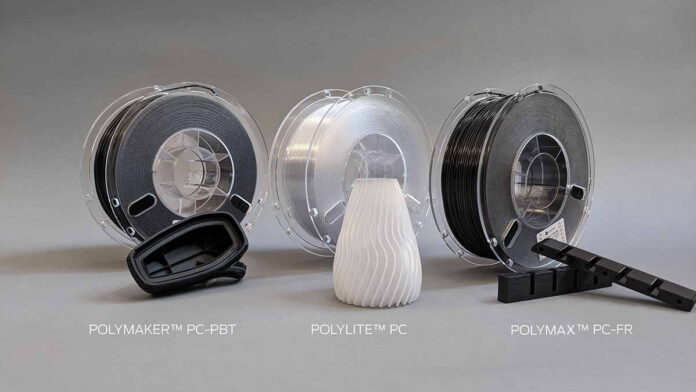MakerBot announced that Polymaker, one of the leading providers of 3D printing materials has qualified three polycarbonate materials for MakerBot LABS for the MakerBot METHOD X 3D printer. These materials, while bringing new features to the METHOD X machine for a wide range of engineering applications; it aims to reduce problems such as warping and curling when used with conventional desktop 3D printers. With the new materials added, MakerBot LABS increased the number of materials in the METHOD material portfolio to 9; while the total number of materials on the METHOD platform increased to 19.
Polymaker PC-PBT, PolyMax PC-FR, and PolyLite PC are available to print on the METHOD X 3D printer; with the MakerBot LABS Experimental Extruder. This extruder turns METHOD into an open materials platform; enabling users to print with a wide variety of third-party materials on an industrial 3D printing platform. Polycarbonate is a material with a unique balance of toughness, good light transmission, high heat and excellent electrical resistance. But if polycarbonate is cooled too quickly, it can be difficult to print due to its ability to contract.
Engineers push the boundaries of their 3D printed parts with polycarbonate
The MakerBot METHOD X 3D printer is the only printer in its price class with a heated chamber that reaches up to 110°C; letting the parts cool down gradually to minimise curling and warping. METHOD controls how fast a part cools down during the printing process; allowing it to print polycarbonate and other advanced materials more successfully than typical desktop 3D printers that only have a heated build plate. Due to these properties, polycarbonate materials are commonly used for functional prototyping and end-use parts in the production of automotive components, protective gear, medical device components, and exterior lighting fixtures.
PhD President of Polymaker, Xiaofan Luo said that polycarbonate is often the choice for parts that function in demanding applications. Stating that its mechanical properties, flame retardance, and chemical resistance also allow engineers to push the boundaries of their 3D printed parts and experiment with new geometries, Luo told; “Anyone who is serious about printing polycarbonate knows that a heated chamber is essential for printing large and strong complex parts. METHOD is bringing industrial capabilities to a desktop machine; and we think its users will really benefit from the material properties our PC range offers”.

Good chemical resistance of PBC combines with strength of PC
Polymaker PC-PBT is a specialty material that maintains good toughness and natural ductile fracture behaviour at low temperatures. This combines the good chemical resistance of PBT (polybutylene terephthalate) with the strength and toughness of polycarbonate. Compared to PC resins and PC-ABS compounds; this polymer blend offers better resistance to chemicals, which enables printed applications where resistance to intermittent contact with fuels, oils, lubricants, or cleaners is necessary. It performs well under extreme circumstances, whether in contact with hydrocarbon-based chemicals or operating at sub-zero temperatures.
A flame-retardant polycarbonate material, PolyMax PC-FR meets the UL-94 V0 standard, an important fire safety specification. The material displays excellent toughness, strength, and heat resistance, making it ideal for applications within the automotive, railway, and aerospace industries. PolyLite PC is produced using a polycarbonate resin specifically engineered for 3D printing. This material demonstrates a high modulus, making it ideal for applications that require good stiffness and light diffusion; such as outdoor light housings. PolyLite PC is available in transparent colour, showing good optical clarity, rendering parts with an attractive crystal shine. To further strengthen polycarbonate parts, Polymaker recommends annealing them right after the printing process to release the residual internal stress.
